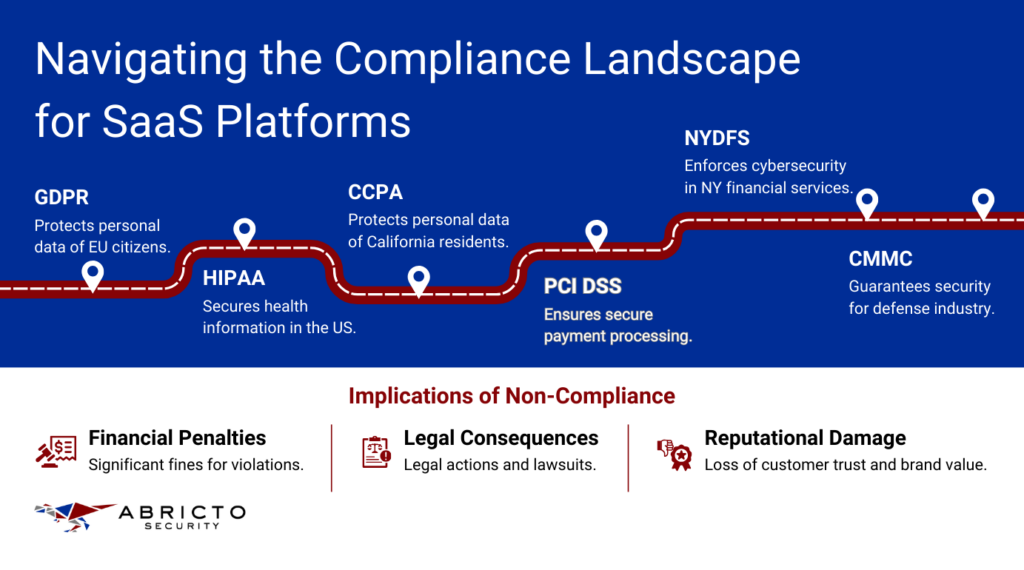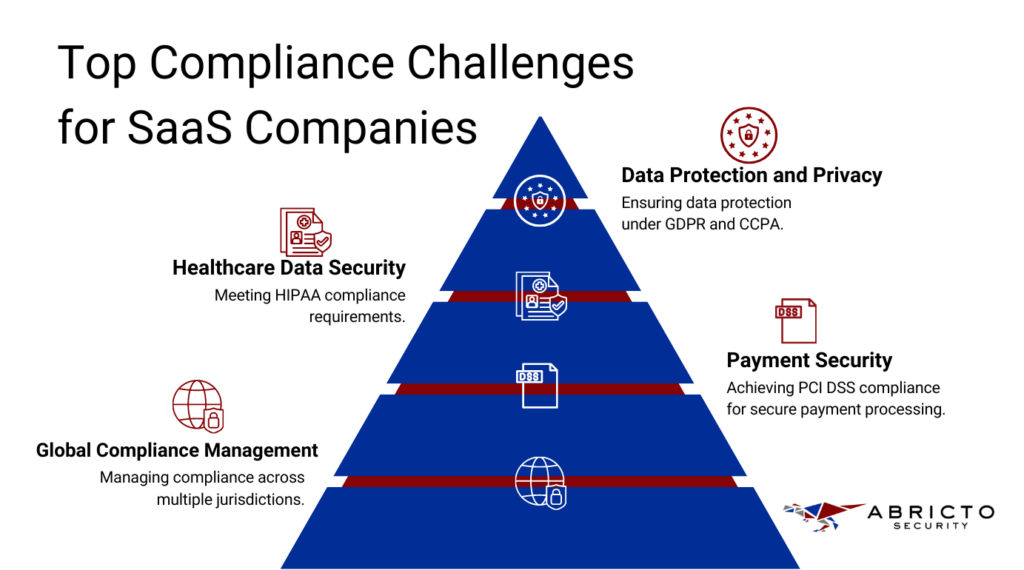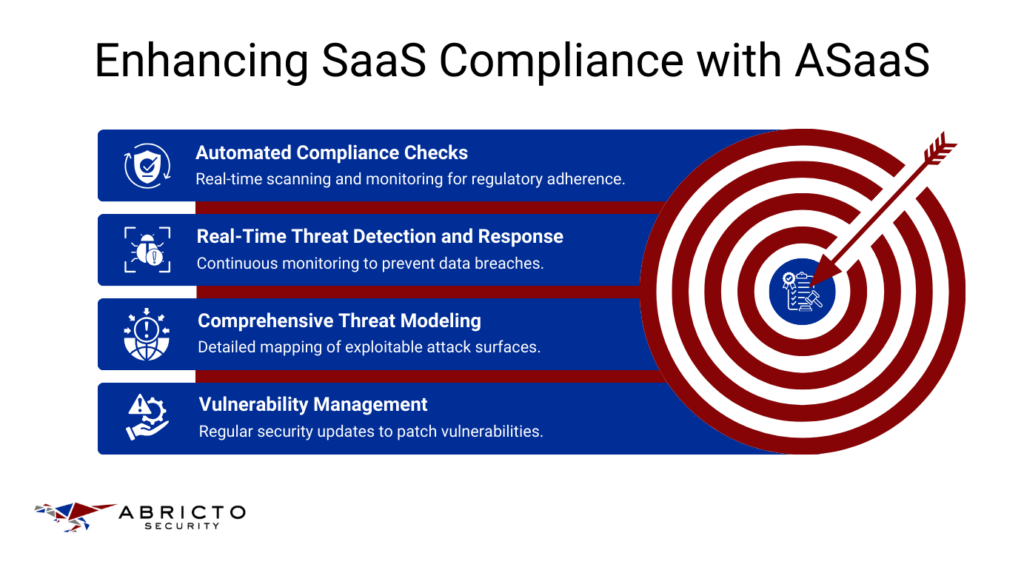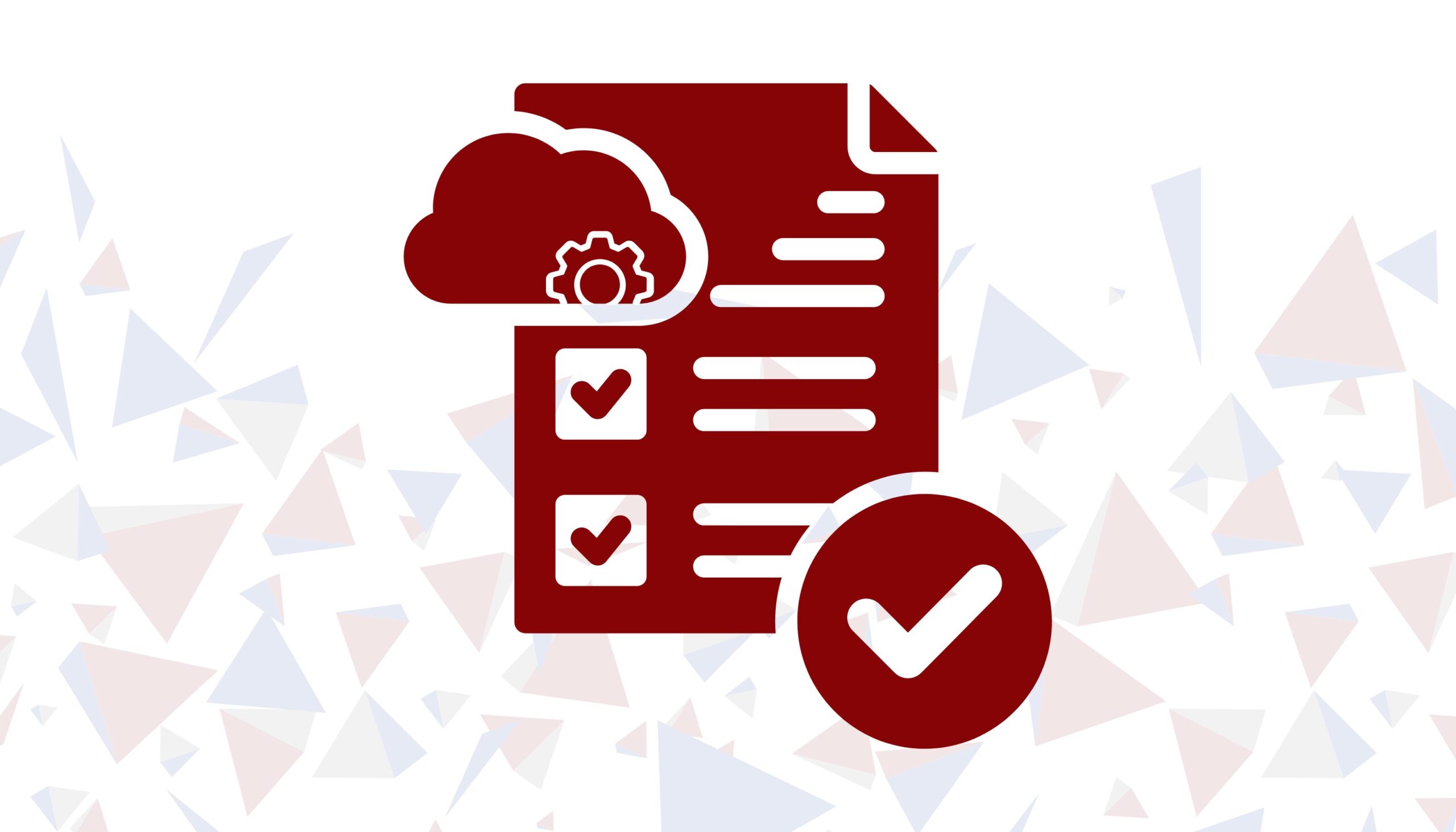Introduction
Managing regulatory compliance is a significant challenge for SaaS platforms. Product Owners and CTOs must balance these demands with operational efficiency. This article explores how Application Security as a Service (ASaaS) can address these compliance challenges by streamlining processes, enhancing security, and mitigating risks.
The Compliance Landscape for SaaS Platforms

Ensuring compliance with a variety of regulatory standards is essential for SaaS companies. Non-compliance can lead to substantial financial penalties, legal ramifications, and significant reputational damage.
Key regulations impacting SaaS platforms include:
GDPR: General Data Protection Regulation
The GDPR safeguards the personal data of EU citizens, requiring companies to implement rigorous data protection measures and provide individuals with enhanced control over their personal information. SaaS companies must prioritize data privacy and security to comply with GDPR, as violations can result in substantial fines.
HIPAA: Health Insurance Portability and Accountability Act
HIPAA establishes standards for protecting sensitive patient data in the U.S. SaaS platforms handling healthcare information must implement stringent security measures across physical, network, and process domains to ensure compliance. Non-compliance with HIPAA can lead to severe penalties and legal actions.
CCPA: California Consumer Privacy Act
The CCPA protects the personal data of California residents, mandating that companies disclose their data collection practices and allowing consumers to request the deletion of their data. SaaS platforms must adhere to CCPA requirements to avoid significant fines and legal consequences.
PCI DSS: Payment Card Industry Data Security Standard
PCI DSS ensures the secure handling of credit card information. SaaS companies involved in payment processing must adhere to PCI DSS standards to protect cardholder data, mitigate the risk of data breaches, and avoid costly penalties.
NYDFS: NY Department of Financial Services
The NYDFS cybersecurity regulation imposes strict requirements on financial services companies operating in New York. SaaS platforms serving this sector must implement comprehensive cybersecurity programs, conduct regular risk assessments, and report any cybersecurity events to comply with NYDFS standards.
CMMC: Cybersecurity Maturity Model Certification
CMMC is a unified cybersecurity standard for the defense industrial base, requiring companies to implement specific cybersecurity practices and processes. SaaS platforms providing services to the Department of Defense must achieve CMMC certification to demonstrate their cybersecurity maturity and ensure compliance.
Implications of Non-Compliance
Failure to comply with these regulations can have serious consequences for SaaS companies.
Financial Penalties
Non-compliance with regulatory standards can result in significant fines, substantially impacting a company’s financial stability. For SaaS platforms, these fines can reach millions of dollars, depending on the severity and nature of the violation.
For example, GDPR non-compliance can lead to fines of up to 4% of a company’s annual global turnover. These financial penalties strain company resources and divert funds from critical business operations and growth initiatives.
Legal Consequences
Regulatory violations can lead to extensive legal actions and lawsuits, which are both costly and time-consuming. SaaS companies may face class-action lawsuits from affected individuals, especially in cases involving data breaches and privacy violations.
Legal proceedings require substantial investment in legal representation and can result in further penalties or mandatory operational changes. The legal entanglements can also hinder business expansion and strategic partnerships, as potential partners and clients may be wary of associating with a company entangled in legal issues.
Reputational Damage
Non-compliance can severely erode customer trust and damage a company’s brand value. In the SaaS industry, where trust and reliability are paramount, a tarnished reputation can lead to customer churn, difficulty in acquiring new customers, and a drop in market share. News of non-compliance and associated breaches can spread rapidly, impacting public perception and investor confidence.
The long-term effects can include decreased competitive advantage, challenges retaining top talent, and increased scrutiny from regulators and industry watchdogs. Restoring a damaged reputation requires significant effort and resources, often involving rebranding and extensive customer outreach programs to rebuild trust.
Compliance Challenges for SaaS

Data Protection and Privacy
As a product owner in a SaaS company, you’re likely familiar with the constant pressure to ensure data protection and privacy, especially under regulations like GDPR and CCPA. These regulations are designed to protect user data, but integrating their requirements into your existing systems can be a major headache.
GDPR, for instance, demands that you secure user consent, manage data access rights, and handle requests for data deletion—all while keeping your operations running smoothly. CCPA adds another layer by requiring transparency in data collection practices and providing consumers the right to opt-out of data selling.
To navigate these challenges, consider focusing on:
- Data Encryption: Encrypting data at rest and in transit to prevent unauthorized access is crucial, though it requires ongoing management and can be resource-intensive.
- Access Controls: Data access should be limited to only authorized personnel through stringent access controls, which need continuous monitoring and updates.
- Regular Audits: Conducting frequent audits to identify and fix vulnerabilities can help maintain compliance, though it demands dedicated resources.
Healthcare Data Security
For those of you dealing with healthcare information, HIPAA compliance is likely a constant concern. HIPAA sets high standards for protecting sensitive patient data, requiring robust administrative, physical, and technical safeguards. This means ensuring data encryption, controlling access, and performing regular security audits. Maintaining these safeguards consistently across all operations is challenging which can feel like a never-ending task.
Here are some steps to mitigate these challenges:
- Secure EHRs: Focus on encrypting electronic health records and implementing strict access controls to ensure data integrity.
- Regular Security Training: Keep your team updated with regular training on HIPAA compliance and data protection best practices.
- Continuous Monitoring: Implement continuous monitoring systems to detect breaches and respond swiftly to any incidents.
Payment Security
Handling payment data brings its own set of challenges, particularly with PCI DSS compliance. This standard requires you to secure payment processing, storage, and transmission. It means adopting encryption, network segmentation, and conducting regular vulnerability scans and penetration tests. Maintaining these measures can be demanding but essential to prevent data breaches and retain customer trust.
Consider these strategies:
- Secure Payment Gateways: Use trusted payment gateways to handle transactions securely.
- Tokenization: Protect payment data by replacing sensitive information with tokens, reducing the risk of exposure.
- Continuous Monitoring: Regularly monitor transaction processes to detect and mitigate fraudulent activities, ensuring a secure payment environment.
Global Compliance Management
If your SaaS operates internationally, managing compliance across different jurisdictions can feel like navigating a minefield. Each region has its own regulatory requirements, and staying on top of these can be overwhelming. Understanding global regulations and implementing adaptable compliance strategies are critical but challenging tasks.
To manage global compliance effectively:
- Regular Compliance Reviews: Periodically review your compliance status across all jurisdictions to stay ahead of any potential issues.
- Update Policies and Procedures: Keep your policies and procedures current with the latest regulatory changes.
- Compliance Management Tools: Invest in specialized software to track and manage compliance requirements globally, easing the burden on your team.
How ASaaS Enhances Compliance for SaaS Platforms

Automated Compliance Checks
As a product owner, you understand the relentless demands of regulatory compliance. ASaaS (Application Security as a Service) alleviates some of this burden through automated compliance checks. These systems provide continuous, real-time scanning and monitoring, ensuring your SaaS platform adheres to the latest regulatory standards without manual intervention.
For example, with GDPR, ASaaS can automatically detect and flag non-compliant data handling practices. This immediate detection allows you to promptly address issues, such as improper data storage or unauthorized access before they escalate into significant regulatory violations. By automating these checks, you can ensure ongoing compliance and reduce the risk of costly fines and legal repercussions.
Real-Time Threat Detection and Response
Real-time threat detection and response are crucial for preventing data breaches and maintaining regulatory compliance. ASaaS offers continuous monitoring of your systems, identifying and mitigating potential threats as they arise. This proactive approach helps safeguard sensitive information, which is crucial for compliance with regulations like HIPAA and CCPA.
In practical terms, ASaaS can monitor for unusual activity patterns that may indicate a security breach. For instance, if there are internet-exposed management portals or file upload services containing patient data, ASaaS will alert your security team immediately. This allows for a rapid response, such as isolating the compromised service or initiating a detailed investigation, thereby preventing potential breaches and ensuring compliance with HIPAA’s strict data protection requirements.
Comprehensive Threat Modeling
Preparing for audits and penetration tests is often daunting, but ASaaS simplifies this process through comprehensive threat modeling. Systems are diagrammed and exploitable vulnerability “seams” are drawn to identify areas of the application that are most at-risk.
Vulnerability Management
Regular security updates and vulnerability management are critical for maintaining a secure and compliant SaaS platform. ASaaS provides continuous external vulnerability assessments, helping to identify and address potential weaknesses before they can be exploited.
In the context of CCPA, ASaaS can perform ongoing system interrogations to identify vulnerabilities in your data handling processes. If a weakness is detected, such as an outdated encryption protocol or a misconfigured database, ASaaS will recommend specific actions to remediate the issue. This continuous assessment helps to ensure that your data protection practices remain robust and compliant with evolving regulations.
Integrating ASaaS into your operations enhances your platform’s security and streamlines compliance efforts. This approach mitigates risks and lets you focus more on innovation and growth, knowing that your compliance needs are effectively managed.
Conclusion
Complying with GDPR, HIPAA, CCPA, PCI DSS, NYDFS, and CMMC is crucial to avoid penalties and reputational damage. ASaaS offers automated compliance checks, real-time threat detection, threat modeling, and vulnerability management, making compliance more manageable. Implementing ASaaS ensures compliance and strengthens your SaaS platform’s security. Book a consultation to see how our ASaaS solutions can meet your compliance needs.
